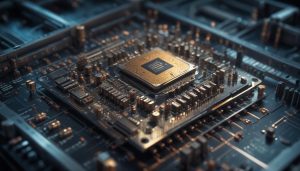AI Tools Transforming Everyday Life and Work
Aiden Foster August 24, 2025
Discover how artificial intelligence tools are shaping your daily routines and workplaces. This guide explores major ways AI-driven technology is now solving real-world problems, raising new questions, and offering fascinating opportunities everyone can learn from.
The Rise of Artificial Intelligence in Daily Routines
Artificial intelligence has transitioned from the realm of science fiction into a fixture of everyday life. Devices equipped with machine learning algorithms now manage everything from our streaming entertainment to home climate settings. Voice assistants, such as those on smartphones or smart speakers, use natural language processing to interpret requests, set reminders, play music, or answer questions. These AI-powered tools are so seamlessly integrated that many barely notice their presence, yet they dramatically impact convenience and efficiency. The adoption of artificial intelligence in daily routines is growing, making tasks smoother and freeing up time for users wanting efficiency at home and beyond. https://www.nist.gov/news-events/news/2023/08/ai-has-moved-house-nist-experts-explain-what-means
Home security, for example, is now highly automated thanks to AI-driven cameras and motion detectors. These smart devices can distinguish between a family pet and a potential intruder, sending only relevant alerts. In the kitchen, AI can recommend recipes based on what’s in your fridge or even suggest healthier alternatives. Large tech companies continue to refine these capabilities, aiming to predict needs and simplify choices. Increasingly, artificial intelligence works in the background across connected devices, making life feel effortless—though questions about privacy and control remain relevant for many households.
Artificial intelligence impacts even simple chores and personal finance. Some banking apps employ AI to predict spending habits, recommend savings plans, and automatically categorize transactions for budgeting. Elsewhere, robot vacuums map out spaces and optimize cleaning schedules according to usage patterns—a blend of robotics and artificial intelligence in action. This steady automation marks a shift: ordinary routines receive upgrades, and repeated manual actions are quietly replaced by self-adjusting systems. This momentum is only likely to accelerate as more people experience the benefits firsthand.
AI Tools Boosting Productivity at Work
Artificial intelligence tools are becoming essential in modern workplaces, supporting decision-making and streamlining repetitive tasks. Many applications use AI to analyze vast sets of data, automating tedious processes like invoice sorting, data entry, or even customer support chat. This allows employees to focus on higher-value responsibilities, improving overall satisfaction and output. Workplace productivity gains from AI integration are regularly highlighted in industry studies, as organizations realize efficiency and flexibility through automation. https://hbr.org/2023/05/how-artificial-intelligence-is-transforming-work
Beyond automation, businesses are turning to AI-powered analytics to spot patterns and forecast trends. Teams leverage machine learning software to predict inventory fluctuations, customer preferences, or potential supply chain bottlenecks. These predictive insights enable agile responses to shifting conditions and can help reduce costly errors. Some marketing departments use generative AI to draft blog posts, emails, or even video scripts, demonstrating how creativity and data-driven insights can merge to produce engaging content. Companies embracing this shift find themselves better positioned for growth in the emerging digital economy.
Remote work and digital transformation have also encouraged adoption of collaboration platforms that use artificial intelligence. Virtual meeting assistants now summarize key points or generate action lists automatically, while project management tools help prioritize assignments using predictive algorithms. These workplace AI advancements support not just efficiency, but inclusivity, by making meetings more accessible and reducing miscommunication. Whether in a small business or a global enterprise, artificial intelligence is shaping a more adaptive, connected, and responsive professional landscape.
Machine Learning in Healthcare and Medical Science
The health sector has seen a wave of innovation due to machine learning and artificial intelligence. Algorithms now analyze images for early disease detection, help schedule hospital resources, and even accelerate drug research. For instance, AI-powered diagnostic software can quickly scan X-rays or MRIs, flagging anomalies for further review. This speeds up care and may catch problems earlier than traditional methods. Machine learning in healthcare is evolving rapidly, with promising results already documented in numerous clinical trials. https://www.ncbi.nlm.nih.gov/pmc/articles/PMC6616181/
Patient monitoring has improved substantially, too. Wearables equipped with sensors track vital signs and use AI to notify doctors of unusual patterns, supporting preventive care. These real-time insights help manage chronic illnesses like diabetes or cardiac disorders more effectively. With better access to data, nurses and physicians can make more informed decisions, enhancing treatment outcomes. The focus remains firmly on patient safety, with artificial intelligence acting as a supportive tool, not a replacement for medical expertise.
Ethical and privacy concerns are always present when discussing AI in health. Patient data must remain protected, and decisions about care need transparency. As machine learning algorithms become more prevalent, ongoing research and oversight play a role in ensuring accuracy, fairness, and privacy. Many medical schools are now beginning to train future clinicians in AI literacy to ensure responsible adoption and meaningful impact in medical settings.
Smart Cities: Urban Life Enhanced by AI
The concept of smart cities relies on artificial intelligence to optimize urban living. AI algorithms are now used to monitor traffic flows, control lighting systems, and reduce energy consumption. Public transit systems have started leveraging predictive analytics to design better schedules and alert commuters to delays. In several cities worldwide, digital twins—virtual models of urban environments—simulate real-time scenarios, helping planners test infrastructure changes before implementation. Through data collection and machine learning, AI enables efficient use of resources and improved quality of life in densely populated areas. https://builtin.com/artificial-intelligence/smart-cities-ai
Safety and security also benefit. Some police departments and emergency services use AI-enabled cameras to recognize incidents, helping with faster responses to accidents or crimes. Urban air quality sensors signal when pollution spikes, guiding policies such as traffic restrictions or green zone expansions. Public spaces become more adaptive, supporting growth without sacrificing sustainability. While there are debates about oversight, many cities are cautiously balancing innovation with public accountability, striving for solutions that benefit all residents.
Community engagement grows as city apps and chatbots make local government services more accessible. Residents can quickly ask questions, report issues, or get updates about city events through AI-powered platforms. These tools are not only streamlining administration but deepening civic involvement, making cities more responsive. As technology matures, the scope for positive change expands, and successful smart city initiatives offer valuable blueprints for others contemplating their own transformation journeys.
Addressing Challenges: Ethics and the Future of AI
With the rise of artificial intelligence comes an urgent need to address ethical considerations. The power of AI is significant, raising vital questions about bias, transparency, and accountability. Machine learning models are only as fair as their input data, and unchecked deployment can reinforce old prejudices. Open discussion and careful testing are essential as organizations and governments put new AI tools into service. Responsible AI is a growing focus for research labs and policymakers. https://ai.google/responsibility/ethics/
Regulation and public awareness play key roles in shaping the future of artificial intelligence. International bodies, national governments, and technology leaders are developing policies aimed at ensuring trustworthy and safe deployment. Major companies are releasing AI principles and public audits to foster user trust. At the educational level, schools and universities increasingly teach AI literacy to prepare people for a society where algorithms regularly influence decision-making. Wider participation in rule-making is crucial for harnessing AI’s benefits while managing risks.
Looking ahead, the potential for AI to drive positive change is vast, but so are the responsibilities. Continuous improvement and transparent communication with the public will shape how technology serves everyone. As society navigates the promise and complexity of artificial intelligence, it remains important to balance creativity with caution, always striving to use AI for the broader good. These conversations will likely intensify as AI tools become more embedded in our shared future.
Future Trends: AI’s Expanding Role in Society
Looking forward, experts anticipate even more disruption from artificial intelligence in sectors like education, transportation, and environmental science. Adaptive learning platforms will likely tailor school lessons to each student’s needs, while AI-driven transportation networks promise to reduce emissions through innovative traffic management. Early adopters in agriculture already use AI to monitor soil and optimize crop yields, making food production more responsive to climate changes. This expansion of AI’s role reflects society’s growing reliance on data and automation. https://www.forbes.com/sites/forbestechcouncil/2023/12/07/future-ai-trends-2024/?sh=738299ae6a74
Collaboration between humans and machines is likely to deepen, with new forms of creative and productive partnership. AI-based platforms are being designed for transparency and adaptability, making them easier to integrate and supervise. Interdisciplinary research—blending computer science, biology, and the humanities—expands AI’s functions in unexpected ways. These developments underline the adaptability of artificial intelligence as technology becomes more embedded into social institutions, reshaping norms and expectations along the way.
The pace of innovation suggests rapid progression, but thoughtful planning remains crucial. The ability to leverage artificial intelligence for good depends on responsible stewardship, investment in research, and public understanding. As society collectively learns from challenges and successes, there’s optimism that AI will enhance equity and opportunity for future generations. Each new advance brings an invitation to reimagine what’s possible with technology at our side.
References
1. National Institute of Standards and Technology. (2023). AI Has Moved Into the Home: NIST Experts Explain What That Means. Retrieved from https://www.nist.gov/news-events/news/2023/08/ai-has-moved-house-nist-experts-explain-what-means
2. Harvard Business Review. (2023). How Artificial Intelligence Is Transforming Work. Retrieved from https://hbr.org/2023/05/how-artificial-intelligence-is-transforming-work
3. Zhang, Z., & Chen, L. (2019). The Role of Artificial Intelligence in Medical Science. Journal of Healthcare Engineering, 1-10. Retrieved from https://www.ncbi.nlm.nih.gov/pmc/articles/PMC6616181/
4. Built In. (2023). Smart Cities: How AI Is Making Cities Smarter. Retrieved from https://builtin.com/artificial-intelligence/smart-cities-ai
5. Google AI. (2024). Ethics in AI. Retrieved from https://ai.google/responsibility/ethics/
6. Forbes Technology Council. (2023). Future AI Trends 2024. Retrieved from https://www.forbes.com/sites/forbestechcouncil/2023/12/07/future-ai-trends-2024/?sh=738299ae6a74







